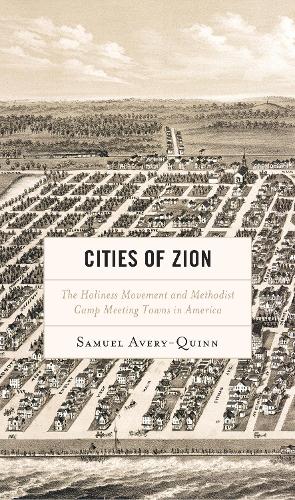
Cities of Zion: The Holiness Movement and Methodist Camp Meeting Towns in America
(Hardback)
Publishing Details
Cities of Zion: The Holiness Movement and Methodist Camp Meeting Towns in America
By (Author) Samuel Avery-Quinn
Bloomsbury Publishing PLC
Lexington Books
14th October 2019
United States
Classifications
Professional and Scholarly
Non Fiction
287.0973
Physical Properties
Hardback
340
Width 160mm, Height 227mm, Spine 24mm
635g
Description
Cities of Zion: The Holiness Movement and Methodist Camp Meeting Towns in America follows Methodists and holiness advocates from their urban worlds of mid-century New York City and Philadelphia out into the wilderness where they found green worlds of religious retreat in that most traditional of Methodist theaters: the camp meeting. Samuel Avery-Quinn examines the transformation of American Methodist camp meeting revivalism from the Gilded Age through the twenty-first Century. These transformations are a window into the religious worlds of middle-class Protestants as they struggled with economic and social change, industrialization, moral leisure, theological controversies, and radically changing city life and landscape. This study comprehensively analyzes camp meeting revivalism in America to offer a larger narrative to the historical movement. Avery-Quinn studies how Methodists and holiness advocates sought to sanctify leisure and recreation, struggled to balance a sense of community while mired in American gender role and race relation norms, wrestled with the governance and town planning of their communities, and confronted the shifting economic fortunes and continuing theological controversies of the Progressive Era.
Reviews
Engaging, readable, broad-gauged, and compelling. A fresh assessment of late 19th century Protestantism (and especially Methodism), of the livable, well-provisioned, urban-like world camp meetings had become, and of the larger causes, campaigns and organizations (think temperance, deaconesses, social reform, institutional churches) by and through which middle class evangelicalism sought to redeem American society.Through careful attention to the variety, strains, conflicts, social realities, and class and racial tensions within the religious communities and to pertinent business and political changes, Cities of Zion revises our understanding of Protestant contributions to American history. Footnotes and bibliography invite readers into the very broad range of scholarship on which the narrative proceeds. -- Russell E. Richey, Emory University
Building on exhaustive research, Samuel Avery-Quinn opens a lens onto middle-class Protestantism in America with this examination of Methodist camp meetings. Through this lens we can see all sorts of changes in economy, theology, geography, and society. Cities of Zion is a superb book, one that changes how we look at this distinctively American phenomenon. -- Randall Balmer, Dartmouth College
In this well-written, thoroughly researched, and interesting account of American Methodist camp meetings, Avery-Quinn describes the larger changes taking place in society and culture from the 19th to the 20th century. Revivalism and camp meetings reflected the aspirations of middle class Protestants and were adapted to the presumed needs of each era from the pre-Civil War years of revivalism and reform to the tumultuous intellectual and cultural clashes of the Gilded Age and Progressive Era. Most critically, Cities of Zion sheds light on how one of America's largest religious groups shaped and was shaped by contemporary culture. It also illuminates the ways that Methodists' efforts were always colored by race, class, gender, propriety, environment, and regionalism . The work is a powerful exploration of religious geography and middle class ideals. -- Randall J. Stephens, University of Oslo
In this masterful book, Samuel Avery-Quinn has ushered in a new era of camp meeting studies and their importance to the story of Methodism in American history. Through the lens of theologically constructed Cities of Zion, this book combines material culture studies, social criticism, and urban city planning with a meticulously researched history of the thick Methodist landscape of the 19th and early 20th centuries. Avery-Quinn has produced a first-rate account that rethinks Methodist history in America and the development of the Holiness Movement within it. Filled with anecdotal evidence, thoughtful theological analysis, and the grand narrative of the National Camp Meeting Association for the Promotion of Holiness, the result is a feast of a book that every Methodist and American Church historian should read. -- Steve Hoskins, Trevecca Nazarene University
Author Bio
Samuel Avery-Quinn is visiting assistant professor at Appalachian State University.
